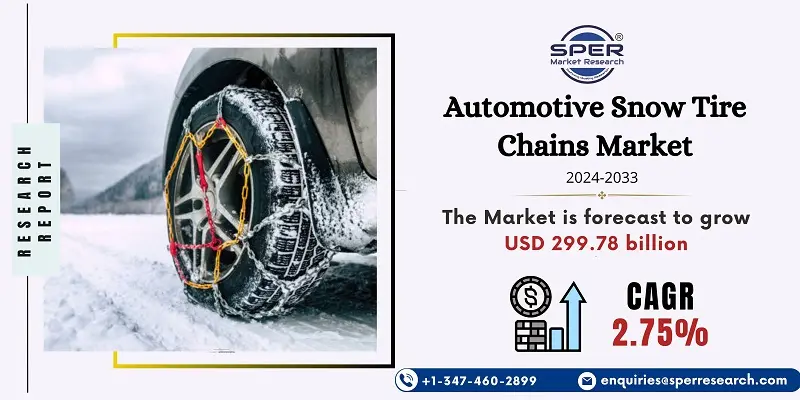
Automotive Snow Tire Chains Market Growth, Size, Trends, Demand, Revenue and Future Outlook
Automotive Snow Tire Chains Market Size- By Type, By Application- Regional Outlook, Competitive Strategies and Segment Forecast to 2033
| Published: Aug-2024 | Report ID: AMIN24185 | Pages: 1 - 247 | Formats*: |
| Category : Automotive & Transportation | |||


| Report Metric | Details |
| Market size available for years | 2020-2033 |
| Base year considered | 2023 |
| Forecast period | 2024-2033 |
| Segments covered | By Type, By Application |
| Regions covered | North America, Asia-Pacific, Latin America, Middle East & Africa and Europe |
| Companies Covered | Babac Tire Chains, Hangzhou Feifei Chain, Jinhua Gowin, Laclede Chain, Lianyi Rubber, Maggi Catene, Ottinger Schneeketten, Peerless Chain, Pewag,Trygg. |
- Vehicle Owners in Snow-Prone Regions
- Fleet Operators and Commercial Vehicle Managers
- Automotive Repair Shops and Service Centers
- Government and Municipal Transportation Departments
- Rental Car Agencies
- Tire Retailers and Auto Parts Stores
- Automotive Accessory Enthusiasts
- Emergency Services and First Responders
| By Type: | |
| By Application: |
- Global Automotive Snow Tire Chains Market Size (FY’2024-FY’2033)
- Overview of Global Automotive Snow Tire Chains Market
- Segmentation of Global Automotive Snow Tire Chains Market by Type (Metal Snow Chain, Non-Metal Snow Chain)
- Segmentation of Global Automotive Snow Tire Chains Market by Application (Passenger Car, Commercial Vehicle)
- Statistical Snap of Global Automotive Snow Tire Chains Market
- Expansion Analysis of Global Automotive Snow Tire Chains Market
- Problems and Obstacles in Global Automotive Snow Tire Chains Market
- Competitive Landscape in the Global Automotive Snow Tire Chains Market
- Impact of COVID-19 and Demonetization on Global Automotive Snow Tire Chains Market
- Details on Current Investment in Global Automotive Snow Tire Chains Market
- Competitive Analysis of Global Automotive Snow Tire Chains Market
- Prominent Players in the Global Automotive Snow Tire Chains Market
- SWOT Analysis of Global Automotive Snow Tire Chains Market
- Global Automotive Snow Tire Chains Market Future Outlook and Projections (FY’2024-FY’2033)
- Recommendations from Analyst
1.1. Scope of the report1.2. Market segment analysis
2.1. Research data source2.1.1. Secondary Data2.1.2. Primary Data2.1.3. SPER’s internal database2.1.4. Premium insight from KOL’s2.2. Market size estimation2.2.1. Top-down and Bottom-up approach2.3. Data triangulation
4.1. Driver, Restraint, Opportunity and Challenges analysis4.1.1. Drivers4.1.2. Restraints4.1.3. Opportunities4.1.4. Challenges4.2. COVID-19 Impacts of the Global Automotive Snow Tire Chains Market.
5.1. SWOT Analysis5.1.1. Strengths5.1.2. Weaknesses5.1.3. Opportunities5.1.4. Threats5.2. PESTEL Analysis5.2.1. Political Landscape5.2.2. Economic Landscape5.2.3. Social Landscape5.2.4. Technological Landscape5.2.5. Environmental Landscape5.2.6. Legal Landscape5.3. PORTER’s Five Forces5.3.1. Bargaining power of suppliers5.3.2. Bargaining power of buyers5.3.3. Threat of Substitute5.3.4. Threat of new entrant5.3.5. Competitive rivalry5.4. Heat Map Analysis
6.1. Global Automotive Snow Tire Chains Market Manufacturing Base Distribution, Sales Area, Product Type6.2. Mergers & Acquisitions, Partnerships, Product Launch, and Collaboration in Global Automotive Snow Tire Chains Market
7.1. Global Automotive Snow Tire Chains Market Size, Share and Forecast, By Type, 2020-20267.2. Global Automotive Snow Tire Chains Market Size, Share and Forecast, By Type, 2027-20337.3. Metal Snow Chain7.4. Non-Metal Snow Chain
8.1. Global Automotive Snow Tire Chains Market Size, Share and Forecast, By Application, 2020-20268.2. Global Automotive Snow Tire Chains Market Size, Share and Forecast, By Application, 2027-20338.3. Passenger Car8.4. Commercial Vehicle
9.1. Global Automotive Snow Tire Chains Market Size and Market Share
10.1. Global Automotive Snow Tire Chains Market Size and Market Share By Region (2020-2026)10.2. Global Automotive Snow Tire Chains Market Size and Market Share By Region (2027-2033)10.3. Asia-Pacific10.3.1. Australia10.3.2. China10.3.3. India10.3.4. Japan10.3.5. South Korea10.3.6. Rest of Asia-Pacific10.4. Europe10.4.1. France10.4.2. Germany10.4.3. Italy10.4.4. Spain10.4.5. United Kingdom10.4.6. Rest of Europe10.5. Middle East and Africa10.5.1. Kingdom of Saudi Arabia10.5.2. United Arab Emirates10.5.3. Qatar10.5.4. South Africa10.5.5. Egypt10.5.6. Morocco10.5.7. Nigeria10.5.8. Rest of Middle-East and Africa10.6. North America10.6.1. Canada10.6.2. Mexico10.6.3. United States10.7. Latin America10.7.1. Argentina10.7.2. Brazil10.7.3. Rest of Latin America
11.1. BABAC TIRE CHAINS11.1.1. Company details11.1.2. Financial outlook11.1.3. Product summary11.1.4. Recent developments11.2. HANGZHOU FEIFEI CHAIN11.2.1. Company details11.2.2. Financial outlook11.2.3. Product summary11.2.4. Recent developments11.3. JINHUA GOWIN11.3.1. Company details11.3.2. Financial outlook11.3.3. Product summary11.3.4. Recent developments11.4. LACLEDE CHAIN11.4.1. Company details11.4.2. Financial outlook11.4.3. Product summary11.4.4. Recent developments11.5. MAGGI CATENE11.5.1. Company details11.5.2. Financial outlook11.5.3. Product summary11.5.4. Recent developments11.6. OTTINGER SCHNEEKETTEN11.6.1. Company details11.6.2. Financial outlook11.6.3. Product summary11.6.4. Recent developments11.7. PEERLESS CHAIN11.7.1. Company details11.7.2. Financial outlook11.7.3. Product summary11.7.4. Recent developments11.8. PEWAG11.8.1. Company details11.8.2. Financial outlook11.8.3. Product summary11.8.4. Recent developments11.9. TRYGG11.9.1. Company details11.9.2. Financial outlook11.9.3. Product summary11.9.4. Recent developments11.10. Others
SPER Market Research’s methodology uses great emphasis on primary research to ensure that the market intelligence insights are up to date, reliable and accurate. Primary interviews are done with players involved in each phase of a supply chain to analyze the market forecasting. The secondary research method is used to help you fully understand how the future markets and the spending patterns look likes.
The report is based on in-depth qualitative and quantitative analysis of the Product Market. The quantitative analysis involves the application of various projection and sampling techniques. The qualitative analysis involves primary interviews, surveys, and vendor briefings. The data gathered as a result of these processes are validated through experts opinion. Our research methodology entails an ideal mixture of primary and secondary initiatives.



Frequently Asked Questions About This Report
PLACE AN ORDER
Year End Discount
Sample Report
Pre-Purchase Inquiry
NEED CUSTOMIZATION?
Request CustomizationCALL OR EMAIL US
100% Secure Payment






Related Reports
Our Global Clients
Our data-driven insights have influenced the strategy of 200+ reputed companies across the globe.




















